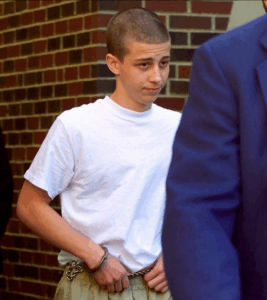
Andrew Douglas Golden was only eleven years old, but in the days before the shooting, he moved with an unsettling confidence. He had been described by some neighbors as polite, even sweet at times. But the closer you looked, the more the picture cracked. Others remembered a different Andrew entirely—a boy who, at just five years old, stood at the edge of his yard and shouted obscenities at passing cars. More than once, neighbors said, he flipped them off from the driveway, his small hand raised in a gesture far too old for his face. When confronted, his father didn’t scold him. He laughed. He said it was funny. “It’ll make a man out of him,” Dennis Golden reportedly joked, dismissing the behavior as harmless, even charming in its rebellion. But it wasn’t harmless. It was an early glimpse of a boy who already understood how to provoke, and of a home where that behavior wasn’t corrected but encouraged.
He was raised in a home steeped in gun culture. His father, Dennis Golden, was an officer in a local pistol-shooting club. His grandfather, a wildlife conservation officer, kept a collection of rifles in the family home. Andrew learned to shoot early, and he was proud of it. In family photos, he posed with guns before he could tie his shoes. His skill with firearms became a kind of identity. What he lacked in height or strength, he made up for with a finger on the trigger.
Still, beneath the surface of this seemingly typical rural upbringing, there were early signs of cruelty. One neighbor recalled Andrew killing a cat with a pellet gun. Others remembered him being rough with kittens and behaving violently toward other kids. One mother said she wouldn’t allow her children to play with him, describing his stare as unnerving and cold. “There was evil in his eyes,” she said. It was an instinctive reaction, not a diagnosis, but one that now feels haunting in its accuracy.
Though he appeared to come from a stable home, Andrew was a boy who knew how to lie, how to charm adults, and how to hide malice beneath a childish grin. At school, he had been asked to leave a daycare center due to fighting and profanity. Teachers disciplined him for misbehavior, but few saw him as dangerous. That judgment would cost lives.
Andrew Golden may have been just eleven, but he carried out his part of the massacre with the coldness of someone far older. He had planned it. Practiced it. And when it was time, he didn’t flinch.
Andrew Golden, like Mitchell, was too young to be tried as an adult under Arkansas law. He was sentenced to confinement until the age of twenty-one and was released quietly in 2007, emerging in Minnesota under a new name (Drew Grant) and a sealed past. For years, he lived in the shadows, attempting to build a life out of the wreckage he had created. But whatever future he imagined was brief. On July 27, 2019, at the age of thirty-three, Andrew Golden died in a car crash in northeastern Arkansas. He was driving a Honda CRV when he collided head-on with another vehicle, killing both himself and the other driver. It was an abrupt, violent end for a man who had once brought violence to others, and it closed the final chapter on one of the youngest school shooters in American history.
Additional Content:
Mitchell Johnson
Andrew Golden and Mitchell Johnson



Leave a Comment